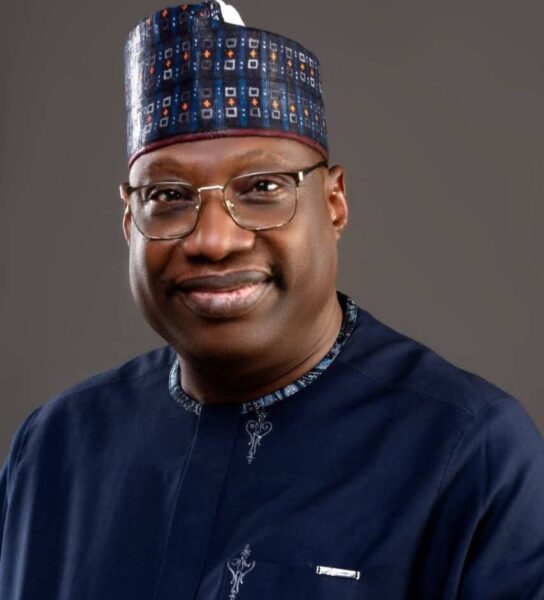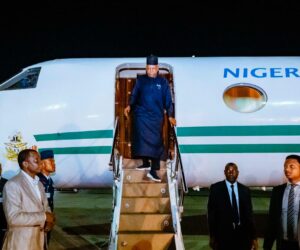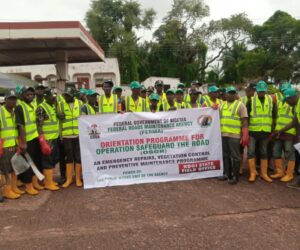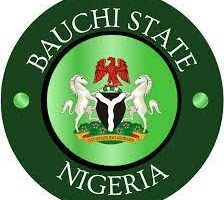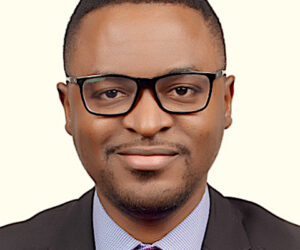Nigeria’s leadership space has seen all kinds of leaders. Some come prepared for the job by years of insights forged in the furnaces experience and constant capacity development while others, are, as Nasir El-Rufai puts it, accidental public servants. The just somehow find themselves in the corridors of power without any plan of how to make the office they hold work for the people. This category, who blunder-on on a daily basis are, unfortunately, many in Nigeria’s public space.
From everything we have seen from Engr. Umar Ahmed Farouk since his arrival at the helm of the Nigerian Airspace Management Agency (NAMA), it’s clear that he’s cut from the former cloth of leaders. Evidence show that he didn’t’ just appear by accident; he came with a quiet authority forged in long service to Nigeria’s aviation system and a clear-eyed plan to steady and modernise the country’s skies. And he has been doing exactly that since assuming leadership in December 2023. Farouk, ever clear about his plan, set about fixing the basics, reshaping internal morale, and putting in place technical and managerial initiatives that aim to move NAMA from a reactive posture to one of sustained professionalism and predictability.
His first change has been in the human resource management and motivation front. Having served diligently and grew through the ranks, he knows that a safe airspace is a people business as much as it is a hardware one. This may be the reason why Farouk reintroduced disciplined but visible staff engagement. From recognition dinners, clearer welfare interventions, and frequent top-to-bottom briefings so that the workforce (engineers, air traffic controllers, technicians and administrators) can be attuned to his vision and make them feel part of the renewal strategy. Motivated staff check details they might otherwise miss; they escalate faults sooner and they own the outcomes. A game-changing Initiative in this regard has been NAMA’s one-year “Staff Recognition Dinner. This event which has been conceptualised for Impactful Leadership and Team Excellence” has proven to be not just another PR stunt, but a signal that the agency’s leadership understands morale as operational currency.
On the technical front, the Farouk administration has prioritised modernisation where it counts. This can be seen in areas such as surveillance, communications, and power resilience. In the months after his arrival, he declared an “emergency on power”; a recognition that unreliable electricity is no small matter when radars, communication links and remote installations must operate 24/7. Complementing the power push is a deliberate programme to upgrade surveillance infrastructure across airports and remote NAMA sites, and strengthen airspace communications so that controllers and pilots have crisp, redundant channels for critical data. This is the kind of investment that reduces delays, prevents misunderstandings and, most importantly, saves lives.
Farouk has also been frank about the hard economics of running an air navigation service provider. Under his watch NAMA has opened conversations about the sustainability of existing air navigation charges and the need to adopt realistic performance bonds and fees that reflect the cost of delivering safe, global-standard navigation services. While industry sharks have tried to dismiss this as populist messaging, aviation experts agreed it’s financial honesty. If national air navigation services are to be world-class, the revenue model has to match the technical obligations. Airlines, government and stakeholders will need to engage constructively so the sector is funded without undermining connectivity.
Partnerships and outreach form the third plank of Farouk’s strategy. NAMA under Farouk has pursued visible collaborations with state governments and airport stakeholders to ensure that infrastructure projects are up to international standard. From the Ibadan airport upgrades to other regional initiatives, many airports are now planned with airspace needs front and centre. Those conversations serve two purposes: First, they anchor NAMA in national development plans, and they help align local projects with international aviation standards. Where airports are modernised without corresponding air navigation upgrades, efficiency gains are limited. Aligning both, therefore, removes that bottleneck.
Beyond hardware, Farouk has been forthright on ensuring institutional processes and governance match technical ambition. The agency moved to tighten standards and management oversight, pushing directors and general managers to operate with measurable KPIs and to document processes against global norms. A modern ANSP (air navigation service provider) runs on data, maintenance schedules and audit trails, and NAMA’s recent orientation towards ISO-quality thinking and procedural audits is a step in that direction. It signals to international partners that Nigeria is serious about conformity and continuous improvement.
Recognition has followed action. Farouk’s leadership has been acknowledged in industry circles and the wider public domain. For once, awards and fellowships conferred on him have proven to be above vanity tokens because they reflect a pattern of purposeful leadership in a sector where competence is non-negotiable. Those endorsements bolster NAMA’s credibility as it negotiates procurement, technical assistance, and revenue reforms with international bodies and airlines.
What does all this mean for travelers, airlines and policy-makers? For the traveling public it promises fewer avoidable delays, clearer communications in emergencies, and an air navigation system that is steadily more predictable. For airlines, the message is that investment in partnership with NAMA rather than fight the inevitable, which is that collaborative funding, performance bonds and pragmatic pricing are the route to reliable regional networks. For policy-makers, Farouk’s tenure is a reminder that aviation safety is infrastructure and governance work. That it requires budgetary commitment, cross-agency coordination and patience to execute complex technical upgrades.
As the changes gain traction, one guarantee is that there will be tough choices. This would include balancing affordable ticketing and sustainable navigation charges, prioritising which remote radar sites get immediate upgrades, and ensuring that procurement is transparent and speedy. But the advantage of the approach the MD has taken is that it is methodical. It starts with the foundations – power, people, processes – and then moves to hardware and partnerships. In systems thinking, that is the right order.
If one were to offer a short checklist as a measure of success over the next 12–24 months, it would include: demonstrable improvement in power resilience across critical NAMA sites; completion or commissioning of prioritised surveillance upgrades; a transparent framework for air navigation charges agreed with industry stakeholders; improved staff satisfaction indicators; and measurable reduction in equipment-related flight disruptions. These are practical, trackable outcomes that turn rhetoric into delivery.
Finally, leadership in agencies like NAMA is often judged not by short headlines but by steady improvement in safety metrics and user experience. Engr. Umar Ahmed Farouk’s tenure so far reads like a deliberate reset. He has chosen to be public about the hard problems — power, financing, modernisation — and to work through the line organisations that actually deliver safety: the engineers, the controllers, the technicians. That is the posture of somebody who knows that leadership is less about photo opportunities and more about clearing the path for consistent technical work.
And in a country like Nigeria where infrastructure and governance reform are constant headlines but with little measurable output, the quiet, technical, and managerial work happening at NAMA deserves attention and support. It’s no magic that when our skies are safe, commerce flows, tourism grows and citizens travel with confidence. Engr. Farouk’s project is a necessary step toward that reality of steady, technical, and focused outcomes rather than optics. The aviation sector should watch closely, partner generously, and measure progress honestly.

